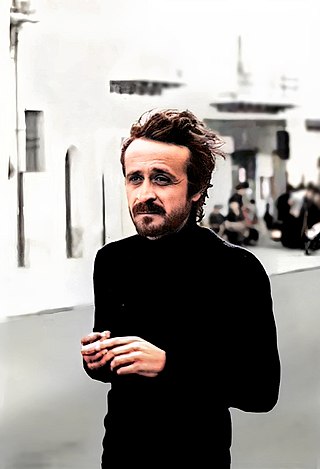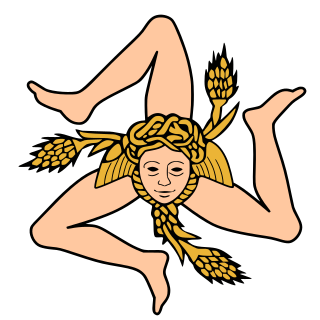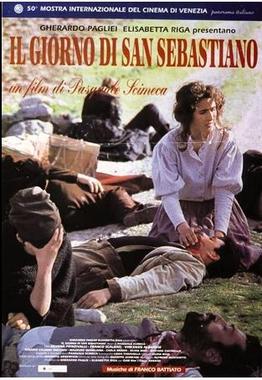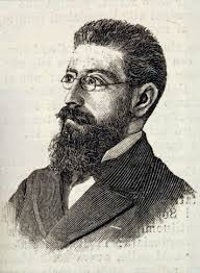
The Fasci Siciliani, short for Fasci Siciliani dei Lavoratori, were a popular movement of democratic and socialist inspiration that arose in Sicily in the years between 1889 and 1894. The Fasci gained the support of the poorest and most exploited classes of the island by channeling their frustration and discontent into a coherent programme based on the establishment of new rights. Consisting of a jumble of traditionalist sentiment, religiosity, and socialist consciousness, the movement reached its apex in the summer of 1893, when new conditions were presented to the landowners and mine owners of Sicily concerning the renewal of sharecropping and rental contracts.

Giuseppe "Peppino" Impastato, was an Italian political activist who opposed the Mafia, which ordered his murder in 1978.

The Movement for the Independence of Sicily was a separatist Sicilian political party originally active in Sicily from 1943 to 1951. Its best electoral result was in 1947, when it won 8.8% of the votes in the Sicilian regional election and had nine regional deputies elected.

Rosario Garibaldi Bosco was an Italian Republican-inspired socialist, politician and writer from Sicily. He was one of the leaders of the Fasci Siciliani, a popular movement of democratic and socialist inspiration in 1891-1894.

Giuseppe De Felice Giuffrida was an Italian socialist politician and journalist from Sicily. He is considered to be one of the founders of the Fasci Siciliani a popular movement of democratic and socialist inspiration. As the first socialist mayor of Catania in Sicily, from 1902 until 1914, he became the protagonist of a kind of municipal socialism.

Nicola Barbato was a Sicilian medical doctor, socialist, and politician. He was one of the national leaders of the Fasci Siciliani dei Lavoratori a popular movement of democratic and socialist inspiration in 1891–1894, and perhaps might have been the ablest among them according to the Marxist historian Eric Hobsbawm.

Bernardino Verro was a Sicilian syndicalist and politician. He was involved in the Fasci Siciliani, a popular movement of democratic and socialist inspiration in 1891–1894, and became the first socialist mayor of Corleone in 1914. He was killed by the Mafia.

Nicola Alongi, was a Sicilian socialist leader, involved in the Fasci Siciliani a popular movement of democratic and socialist inspiration in 1891–1894. He was killed by the Mafia.
The Sicilian People's Movement was a regional centrist political party active in Sicily, Italy. It was founded in 2012 by the merge of Allied for Sicily and some civic associations. Riccardo Savona was elected president of the party. ApS was in turn formed in May 2011 by former members of PdL, UDC and PD in support of Raffaele Lombardo's regional government. The party, which at its foundation counted 6 regional deputies, was a close ally of the Movement for the Autonomies.

Il giorno di San Sebastiano is an Italian film written and directed by Pasquale Scimeca. The film is based on true historical events, the Caltavuturo massacre that took place on January 20, 1893, in Caltavuturo in the Province of Palermo (Sicily), during the celebration of Saint Sebastian.
Events from the year 1893 in Italy.

The Giardinello massacre took place on December 10, 1893, in Giardinello in the Province of Palermo (Sicily) during the Fasci Siciliani uprising. Eleven people were killed and 12 seriously wounded after a rally that asked for the abolition of taxes on food and disbandment of the local field guards. The protestors carried the portrait of the King taken from the municipality and burned tax files.

Nicola Petrina was an Italian socialist and politician from Sicily. He was one of the national leaders of the Fasci Siciliani a popular movement of democratic and socialist inspiration from 1891 to 1894.

Agostino Lo Piano Pomar was a Sicilian lawyer, socialist and politician. He was one of the national leaders of the Fasci Siciliani a popular movement of democratic and socialist inspiration in 1891-1894.

The Lercara Friddi massacre took place on Christmas-day 1893 in Lercara Friddi in the Province of Palermo (Sicily) during the Fasci Siciliani uprising. According to different sources either seven or eleven people were killed and many wounded.

Giacomo Montalto was an Italian Republican-inspired socialist, politician and lawyer. He was one of the leaders of the Fasci Siciliani, a popular movement of democratic and socialist inspiration in 1891–1894.
Sicily Nation is a separatist Italian political party active in Sicily.
The Sicilian National Movement is a separatist coalition of parties active in Sicily.

Giovanni Noè was an Italian lawyer, anarchist and politician, involved in the Fasci Siciliani, a popular movement of democratic and socialist inspiration in 1891–1894. He was elected in Italian Chamber of Deputies in 1900 and 1904.















